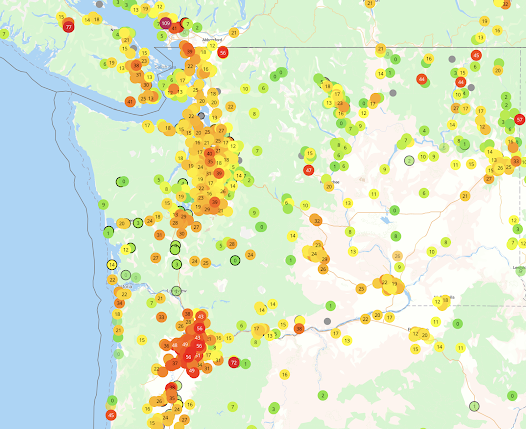Why is staying so warm tonight?
I am sitting at my computer right now, with sweat literally covering my face. It is not cooling off quickly tonight. And this morning started quite warm, with a very high low temperature.
There is a reason.
We start with warm air over us today, with highs getting into the mid-80s around Puget Sound, 90s in the south Sound and SW Washington and into the low 100s in eastern Washington (click on image to expand). Warm air associated with an upper ridge.
Each day we have gotten warmer, both for our highs and low (see temperatures at Sea Tac below)
The winds have also declined and wind helps pull heat away from our skin and promotes evaporative cooling.
But compared to the eastern U.S. we have little to complain about. Dew points are in the mid-70s (at 5 PM) over the SE quarter of the U.S. Very sticky--no wonder folks there are taking their chances in air conditioned spaces. And no wonder nighttime temperatures stay warm in the SE U.S.
Tomorrow will be a bit cooler and then much cooler on Wednesday as marine air pushes in.
There is a reason.
We start with warm air over us today, with highs getting into the mid-80s around Puget Sound, 90s in the south Sound and SW Washington and into the low 100s in eastern Washington (click on image to expand). Warm air associated with an upper ridge.
Each day we have gotten warmer, both for our highs and low (see temperatures at Sea Tac below)
But something else has been happening that has taken away the crisp, refreshing feel of a few days ago, leaving us sweating tonight...the moisture in the air has increased, as measured by the dew point temperature. The higher the dew point temperature, the more moisture in the air. Here is a plot of the dew point at Sea Tac Airport the last few days--major shift upwards from around 50 to 60F. You can feel that.
More moisture means evaporation on our skin is less effective. And water vapor in the air acts as an atmospheric blanket, reducing cooling at night. Why? Because water vapor very actively absorbs and emits infrared radiation, and the loss of heat through infrared radiation is how the earth's surface cools at night.
The winds have also declined and wind helps pull heat away from our skin and promotes evaporative cooling.
But compared to the eastern U.S. we have little to complain about. Dew points are in the mid-70s (at 5 PM) over the SE quarter of the U.S. Very sticky--no wonder folks there are taking their chances in air conditioned spaces. And no wonder nighttime temperatures stay warm in the SE U.S.







Comments
Post a Comment